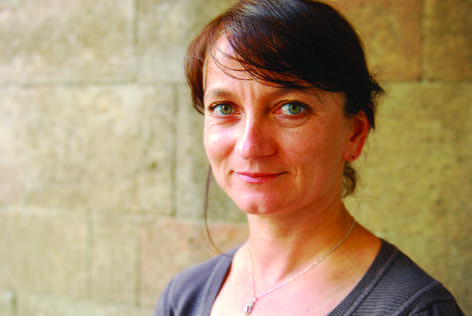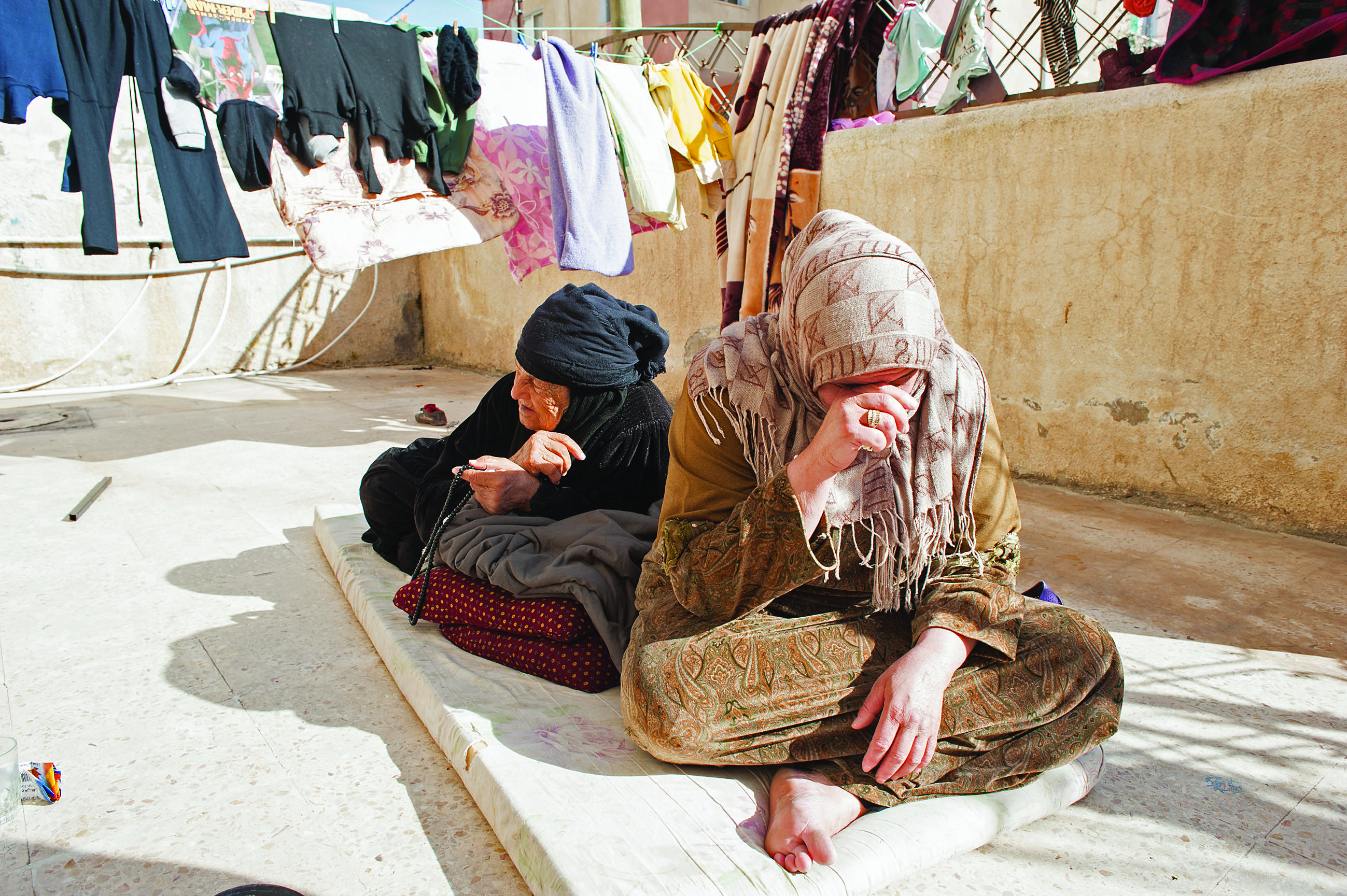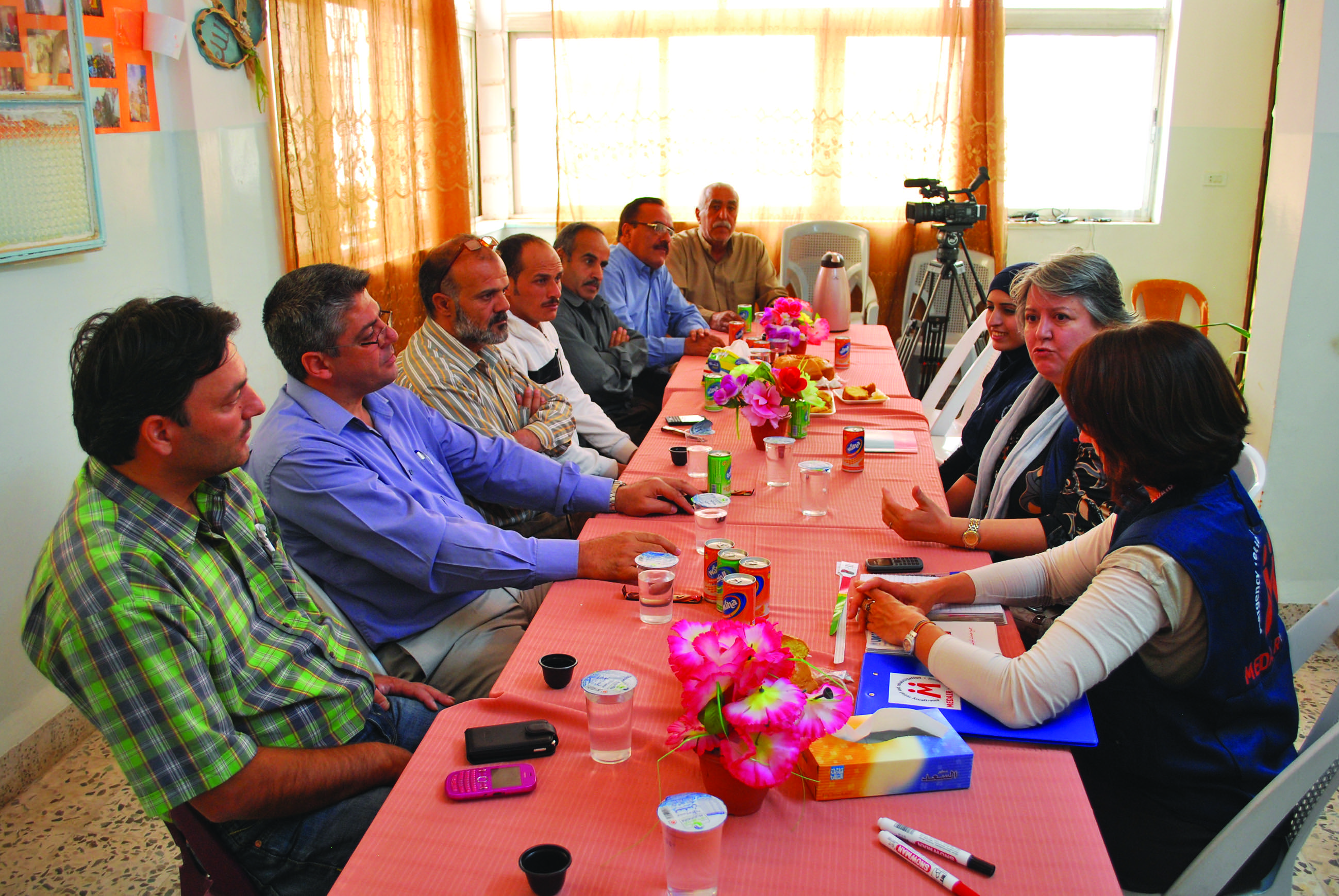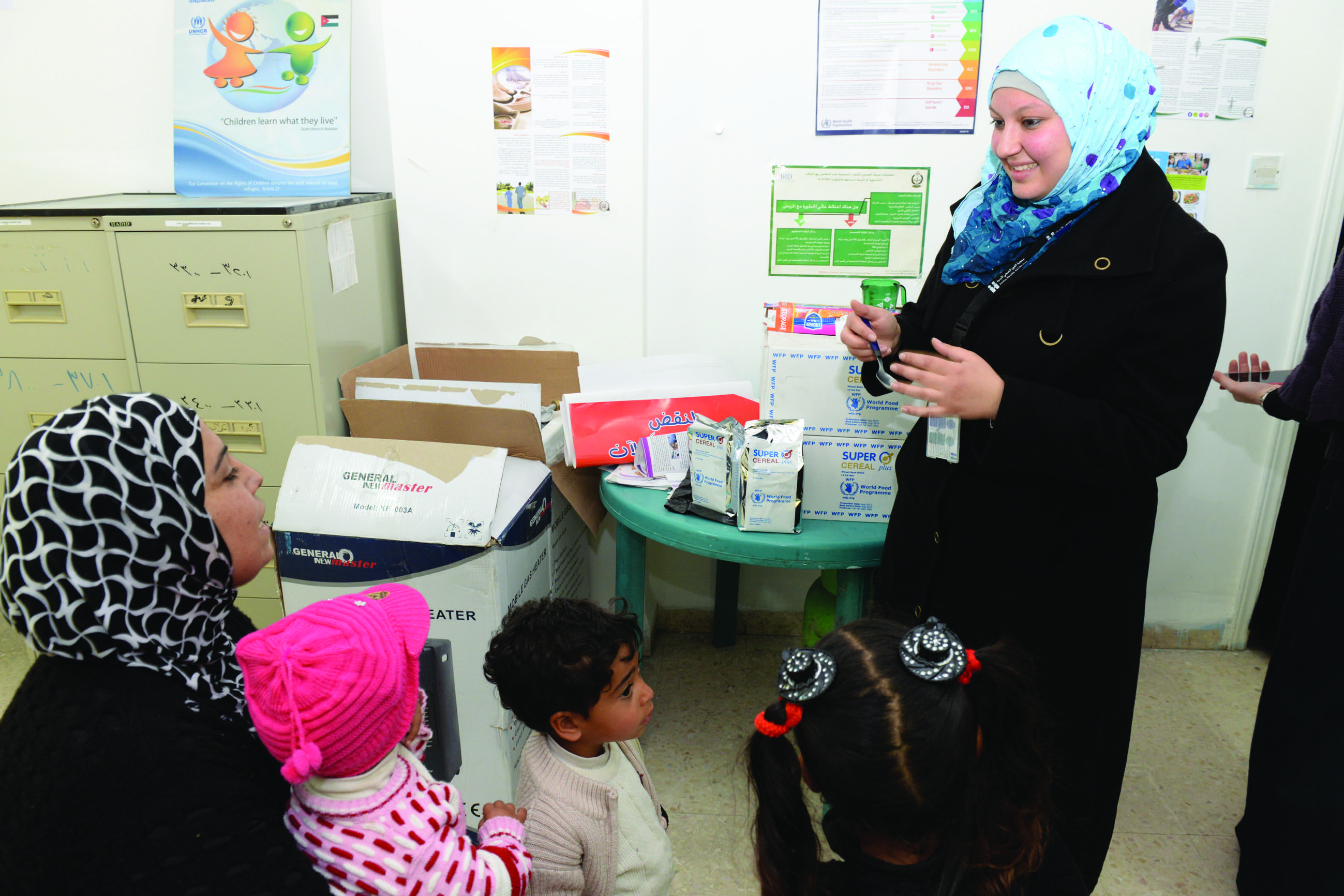Responding to nutrition gaps in Jordan in the Syrian Refugee Crisis: Infant and Young Child Feeding education and malnutrition treatment
 By Gabriele Fänder and Megan Frega
By Gabriele Fänder and Megan Frega
Gabriele Fänder is the Regional Health and Nutrition Advisor with Medair in the Syria Crisis Response Programme, based in Amman. Previous work experience in various roles in Somalia/Somaliland, Afghanistan and India.
Megan Frega is the Regional Communication Officer for the Medair Syria Crisis Programme. Megan is based in Beirut and is the media liaison and external communication focal point. Comms-syr@medair.org
 This project is supported through generous funding from UNICEF and WFP.
This project is supported through generous funding from UNICEF and WFP.
Background
At the start of 2012, there were only a handful of Syrian families who had taken refuge in Jordan. By September of the same year, the number of refugees had increased to about 45,000; one year later, it had grown by half a million. Conflict and violence in Syria drove hundreds of thousands into neighbouring nations, without resources or means to survive. The sudden population influx and need for basic items, food, shelter, and health care for over half a million people exacerbated the existing problems of scare resources.
 Prior to the Syrian crisis, infant and young child feeding (IYCF) practices were poor in the region evidenced by low exclusive breastfeeding prevalence for infants less than 6 months1 and high anaemia prevalence rate among children of toddler age2. According to FAO (2011)3, early initiation of breastfeeding amongst mothers in Syria was very low at 32%, while reports on the national level indicate a prevalence of 46%4. The most recent figures report exclusive breastfeeding prevalence at 42.6%5 and only 37% of children 6-9 months of age had been introduced to complementary foods6. Early initiation of breastfeeding and exclusive breastfeeding amongst infants less than 6 months of age is significantly lower in Jordan, at 39% and 22% respectively7. These findings suggest inadequate pre-existing health and nutrition preventive behaviours, especially poor infant and young child feeding practices, amongst both the refugee and host populations.
Prior to the Syrian crisis, infant and young child feeding (IYCF) practices were poor in the region evidenced by low exclusive breastfeeding prevalence for infants less than 6 months1 and high anaemia prevalence rate among children of toddler age2. According to FAO (2011)3, early initiation of breastfeeding amongst mothers in Syria was very low at 32%, while reports on the national level indicate a prevalence of 46%4. The most recent figures report exclusive breastfeeding prevalence at 42.6%5 and only 37% of children 6-9 months of age had been introduced to complementary foods6. Early initiation of breastfeeding and exclusive breastfeeding amongst infants less than 6 months of age is significantly lower in Jordan, at 39% and 22% respectively7. These findings suggest inadequate pre-existing health and nutrition preventive behaviours, especially poor infant and young child feeding practices, amongst both the refugee and host populations.
 Breastfeeding practices need to be protected during emergencies; it is well known that infants who are not breastfed are at a manifold higher risk of morbidity and mortality than breastfed children8. Breastfeeding is emotionally and psychologically restorative to women under stress. A woman’s body is designed to feed and nurture her child even under difficult circumstances. In emergency situations, appropriate and safe IYCF practices are less likely than under stable conditions. Bottle feeding comes with increased risks; poor water quality, an inability to sterilise the bottle/nipple, artificial ingredients in breastmilk substitutes (BMS), and lack of sustainability, can all contribute to poor nutrition and health in infants dependent on BMS.
Breastfeeding practices need to be protected during emergencies; it is well known that infants who are not breastfed are at a manifold higher risk of morbidity and mortality than breastfed children8. Breastfeeding is emotionally and psychologically restorative to women under stress. A woman’s body is designed to feed and nurture her child even under difficult circumstances. In emergency situations, appropriate and safe IYCF practices are less likely than under stable conditions. Bottle feeding comes with increased risks; poor water quality, an inability to sterilise the bottle/nipple, artificial ingredients in breastmilk substitutes (BMS), and lack of sustainability, can all contribute to poor nutrition and health in infants dependent on BMS.
Early IYCF assessment
Medair arrived in Jordan at the start of the Syrian crisis in 2012, to respond to the growing public health and shelter needs. From the start, IYCF and nutrition were identified as a large public health need that was not being covered by other agencies. Medair chose to focus efforts on IYCF to prevent a rise in malnutrition as the crisis deepened. At the beginning of the IYCF project, Medair explored IYCF practices among Syrian refugee mothers through individual interviews and focus group discussions in November 2012 to probe community perceptions and practices. An assessment in November 2012 set a baseline for IYCF indicators to monitor the project.
The November 2012 assessment found that Jordanians and Syrians had similar misconceptions surrounding breastfeeding. Few mothers or caretakers understood the benefits or importance of exclusive breastfeeding for infants for the first six months. Refugees often reported they exclusively breastfed but on probing, were found to give other fluids to their infants. Another common misconception was that bottle feeding was preferable, and that stress on a woman’s body prevents her from breastfeeding. Older generations with poor education on the benefits of breastfeeding often counsel younger women to give BMS, and younger women almost exclusively follow this advice. Misconceptions amongst caregivers and mothers during the discussions included poor advice, telling women to “give water and herbs,” or that “breastmilk alone is insufficient for infants,” and “traditional approaches are preferred.”
Additional assessments found that medical staff in local clinics and hospitals often gave wrong or conflicting advice about breastfeeding to caretakers, contributing to poorer nutrition and breastfeeding practices. Many hospitals and clinics often did not emphasise the importance and nutritional benefits of colostrum9 after delivery. Some doctors advised women that breastmilk alone was not sufficient, depending on the women’s diet or personal nutrition.
IYCF programme
In 2012, Medair began the IYCF project through a partnership with the Jordan Health Aid Society (JHAS), a national NGO10. The purpose of the project is to protect children under five years and pregnant and lactating women (PLW) by screening for malnutrition and educating caregivers about IYCF practices. The project focuses on education on exclusive breastfeeding for expectant mothers, targets mothers with infants less than 6 months of age to encourage exclusive breastfeeding, and targets mothers with children less than 2 years to encourage the correct and timely introduction of complementary food.
Working in collaboration with JHAS in northern Jordan, Medair began education and promotion groups in JHAS clinics and in mobile clinics in the surrounding areas. Each of the six fixed clinics and one mobile clinic are staffed with a nutrition officer who is responsible for IYCF promotion and breastfeeding counselling and oversees the management of acute malnutrition in the related health clinic. During 10 months of project implementation, 4,690 PLW received IYCF education and 919 mothers engaged in breastfeeding counselling sessions. Medair also delivered training on IYCF, malnutrition screening and malnutrition treatment, to health staff, doctors, technicians and nurses from six JHAS clinics outside Za’atari camp, one JHAS clinic inside Za’atari camp and one mobile clinic. The partner clinics are located in Amman (2), Zarqa, Mafraq, Ramtha and Irbid. The mobile clinic covers the South of Jordan (Karak, Madaba, Tafila, Ma’an, Aqaba).
Community networking
In 2013, Medair incorporated a community networking component into the programme that employed volunteers to educate the refugee community on IYCF practices and to screen for malnutrition. Many of the Jordanian volunteers educating the refugee communities were equally unaware of the importance of exclusive breastfeeding, and appreciated the training for their own families. Training took place in the JHAS training centre in Amman or in the Medair office in Mafraq (North Jordan). Community volunteers initially received three days of training on IYCF, nutrition including acute malnutrition, BCC (Behaviour Change Communication) and general health and hygiene topics, specifically preventable communicable diseases. Every month, community volunteers gather in their relevant service area and receive refresher training on these topics.
The community component involves 35 Medair volunteers who conduct house-to-house visits with stand-up education presentations to teach and train entire families. Community volunteers include Syrian and Jordanian men and women, who work to a weekly target of 50-58 household visits. All volunteers receive a weekly incentive and transportation costs upon submitting a weekly work report. The programme coverage area is the six northern governorates of Jordan (Amman, Zarqa, Mafraq, Irbid, Jerash and Ajloun). Over the course of 10 months, 4,977 PLW received IYCF education, and 31,485 caregivers were reached with IYCF and health promotion education through the community project. Each family is taught and counselled depending on the ages of their children, so mothers receive advice on complementary feeding, breastfeeding, and infant nutrition as appropriate. Families also receive information on where to go for additional services, where to get food vouchers, how to enrol in cash-assistance programmes, and where to find additional health services.
Medair also establishes small, individual support groups, so that mothers have the opportunity to sit together and learn from one another. At this point, only two regular mother support groups are fully functioning in Zarqa Governorate. Other groups meet sporadically in all programme areas. The interest to meet and participate in mother groups is very high; sometimes up to 50 women try to participate in one gathering. One of the recommendations emerging from the Medair programme will be to scale up mother support groups in terms of enabling regular meetings of the same small group, to better facilitate learning and influence behaviour change.
Mothers who are unable to breastfeed are referred to Medair partner clinics for professional support. A qualified midwife or an obstetrician/gynaecologist specialist checks mothers to establish reasons for not breastfeeding. Mothers who are willing to re-lactate receive relevant breastfeeding support. Unfortunately, for those mothers who cannot or do not want to breastfeed, there is no support for BMS supply facilitated by any health facility outside Za’atari camp. Security issues surrounding BMS targeted distribution in the camp (see below) have dissuaded community service providers from getting involved in BMS distributions. Infant formula is expensive; a 250g tin costs 5 JOD (7USD) and lasts 4-5 days. As a result, many mothers use cheaper milk powder instead.
Programme coverage and impact
Since the inception of the programme, communities in general, including males and fathers, have been receptive and open to education and learning. Many families have requested additional information about IYCF from volunteers and are eager to learn more. Medair’s project covers 60% of the refugee population in the northern governorates, where, as shown earlier, over 30,000 mothers and caregivers have received promotion and counselling on IYCF (average contacts to May 201411).
A follow up Medair survey was carried out in March 2014 to examine project impact. The sampling frames involved:
- 31,485 caregivers who were visited by the Medair IYCF volunteers between November 2012 and April 2014 and had received breast feeding education.
- 128 caregivers with infants less than 6 months were included in a 24 hour dietary recall to assess breastfeeding status.
The survey showed an increase in breastfeeding knowledge but not an improvement in breastfeeding practice. Knowledge amongst mothers of at least two benefits of breastfeeding had increased from 49.5% (November 2013) to 71% in the community and 91.2% in the health facility setting (March 2014). However, exclusive breastfeeding practice among the mothers who knew about breastfeeding recommendations showed no change (24.2% community survey and 25% health facility based, March 2014) and in fact, was worse than the pre-crisis national prevalence in Syria (42.6%12). These findings show that while a large percentage of families in Jordan have been successfully educated on the benefits of breastfeeding, more time and other measures to address social and cultural barriers are needed actually to effect nutrition behaviour changes.
Among the 91 mothers of infants less than 6 months who were not exclusively breastfeeding, more than half (64.8%, n=59) fed their baby with infant formula, followed by other liquids including water (20%), traditional soup and liquid (16.5%), and raw milk (15.4%). Data from one health facility showed similar results, finding that 44.4% of caregivers who were not exclusively breastfeeding fed their baby infant formula.
Treatment of moderate acute malnutrition (MAM)
To treat MAM in children below 5 years of age and PLW, as implementing partner for WFP, Medair has been distributing Super Cereal Plus in a targeted supplementary feeding programme (TSFP)13. Mothers were initially reluctant to eat this food or give it to their malnourished child, thinking it might cause them harm. However, Medair began cooking demonstrations during distributions at local clinics to show the women how to prepare the food, even eating some with them. The demonstrations have helped remove the stigma of this ‘refugee food’. As soon as the Super Cereal Plus was cooked during demonstrations, children would start eating it, finishing the whole test portion in no time at all. The same applied for reluctant PLW, once they tried the cooked food they all agreed it was quite possible to eat it. However, everyone unanimously agreed it needed sugar to improve the taste. During cooking demonstrations, beneficiaries themselves who had recovered through eating the product, advocated for its use and gave tips on how to improve its taste.
Acute malnutrition screening
Since 2012, screening for acute malnutrition has been undertaken by Medair and community workers, targeting PLW and children under five years. The number of children with acute malnutrition identified through screening is very low, much lower than the expected rate according to the nutrition survey findings in 2012. Out of 46,383 children screened in clinics and communities during the 11 months project period, only 69 severe acute malnutrition (SAM) cases and 124 MAM cases were identified. Out of 10,088 PLW screened during the 11 months project period, 457 were identified as acutely malnourished.
Challenges
BMS donations and supplies
The culture of bottle feeding in Syria and Jordan was perpetuated through the untargeted distribution of breastmilk substitutes (BMS) in the early days of the response and the concept that poor diet among lactating women negatively impacted on their ability to breastfeed. Especially during the first phase of the influx of refugees into Jordan (end of 2012 and through the first half of 2013), many non-governmental organisations (NGOs), community-based organisations and well-meaning donors from Gulf countries distributed huge amounts of BMS to refugees in camps and host communities. BMS products were not distributed according to assessed needs, for example to mothers who were unable to breastfeed. BMS were usually included as a general item in food baskets distributed to refugee families. Those distributions were in general ‘once-off’ distributions with no provision for sustained supply to infants established on these products.
In order to regulate these BMS distributions, the Nutrition Working Group in Jordan developed Standard Operating Procedures on Distribution and Procurement of Infant Formula and Infant Feeding Equipment14. Those guidelines were promoted within the wider NGO community and to donors. From that point onwards, donations were streamlined through UNHCR and all BMS donations stored in a warehouse in Northern Jordan. Managing donations created a large amount of work for the Nutrition Working Group who had to decide what to do with the donations, which far exceeded the need for BMS. At one point, the Nutrition Working Group had to decide what to do with thousands of boxes of different BMS types and milk powder in storage.
For Za’atari camp, to meet the needs of non-breastfed infants, clear protocols were developed for the supply of BMS. Mothers are individually assessed by a qualified midwife from an appointed clinic (run by the national NGO, Jordan Health Aid Society (JHAS)15. Where BMS supply is indicated, the mother obtains a written prescription for BMS, which is supplied at designated distribution points. Outside the camp, managing BMS has proven to be more complicated. Refugees are widespread across all six northern governorates and it is more difficult to find specialised clinics across those Governorates who not only have the expertise to qualify mothers for BMS distribution, but also to facilitate supply. Experience related to riots and attacks on distribution points in the camp related to BMS16 have prevented clinics outside the camp agreeing to store BMS products and be part of a BMS distribution.
Expectations of aid
One of the challenges Medair faces in programming is the need to distribute physical aid along with education. Refugees often expect physical aid - cash, hygiene items, kitchen equipment, etc. - and struggle to see the importance of education without accompanying in-kind assistance. Community volunteers are received with suspicion if they come to “only talk”. Initially, families don’t see the importance of education and promotion related to IYCF. To respond to this demand, volunteers have begun to distribute spoons, cups, and breastfeeding shawls to women with children under 6 months of age, as well as hygiene kits to mothers with children under 2 years. Beneficiaries put the need for cash above all other needs, sometimes failing to recognise the importance of other initiatives. Donors, stakeholders, and medical staff also typically see IYCF support approach as a ‘soft’ approach without much impact.
The timeline for aid delivery is a challenge. In emergencies, short intervention timelines and quick impact programmes are preferred. As reflected earlier, behaviour change requires a longer term approach.
Discussion and recommendations
To tackle social and cultural barriers and increase effectiveness of IYCF promotion in Jordan, additional mother support groups and learning groups need to be incorporated into the education process. Community led and sponsored support groups with cooking demonstrations, continual learning discussions, and referral information should be held regularly.
Doctors and health staff must be targeted as they are the primary source of information for refugees. Doctors must encourage breastfeeding among patients and hospitals must have delivery staff who promote good feeding practices. Mothers must also be informed through antenatal care visits about the importance of exclusive breastfeeding and the benefits of breastmilk versus infant formula. The Jordanian Ministry of Health is a critical partner to champion key IYCF messages within the country. Messaging through radio, television and newspapers about health and hygiene practices must permeate both the Jordanian population and the refugee community. Hygiene materials should be distributed along with messaging to enable long-term behaviour change.
 UNICEF has requested that Medair begin to champion their baby friendly hospitals initiative (BFHI), which will seek to train health workers on the importance of immediate breastfeeding after delivery. None of the clinics which Medair supports has BFHI status, however, this is planned in the next stage of programming.
UNICEF has requested that Medair begin to champion their baby friendly hospitals initiative (BFHI), which will seek to train health workers on the importance of immediate breastfeeding after delivery. None of the clinics which Medair supports has BFHI status, however, this is planned in the next stage of programming.
With regard to the needs of non-breastfed infants, the provision of targeted supplies of BMS in the community setting is a particular challenge and remains an outstanding gap.
During every training session, whether with communities, volunteers or medical staff, Medair have found that participants are excited to learn about how important IYCF practices are and want to learn more. Technical support material in Arabic tailored to the context of the Middle East would greatly help training delivery.
For long-term change to happen, the approach must continue to be community led and focused on the needs of poor, vulnerable families. Physical aid should accompany health messaging and education. Prevention programmes over curative interventions should lead the response.
For more information, contact Gabriele Fänder, email: healthadvisor-syr@medair.org, tel (Jordan): +962 (0)796 294628
1 UNICEF http://www.unicef.org/infobycountry/syria_statistics.html http://www.unicef.org/infobycountry/jordan_statistics.html
2 WHO http://who.int/vmnis/anaemia/data/database/countries/jor_ida.pdf
3 WHO, Nutrition Country Profile, http://apps.who.int/nutrition/landscape/report.aspx?iso=SYR&rid=161&template=nutrition&goButton=Go
4 http://www.unicef.org/infobycountry/syria_statistics.html
5 http://www.unicef.org/infobycountry/syria_statistics.html
6 International Baby Food Action Network, 2011
7 http://www.unicef.org/infobycountry/syria_statistics.html
8 Bahi R, et al. Bull of WHO 2005;83 (6):418-426
9 Colostrum is the breastmilk produced during pregnancy and immediately after birth. It is low in fat, and high in carbohydrates, protein, and antibodies. It is low in volume and provides concentrated, highly digestible nutrition to the newborn.
10 See profile of JHAS in this edition of Field Exchange
11 Mothers with breast feeding difficulties, with sick children and with malnourished children have received several follow up visits during the programme period. This also includes mothers who are malnourished
12 UNICEF, http://www.unicef.org/infobycountry/syria_statistics.html
13 See article by WFP for more details on the TSFP.
14 Available from: http://data.unhcr.org/syrianrefugees/regional.php
15 See article by JHAS and profile of the agency in this edition of Field Exchange.
16 See the article by Save the Children Jordan that elaborates on these BMS problems in Za’atari camp.


